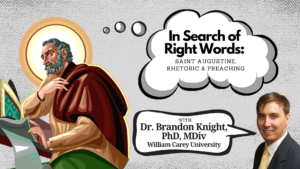 Column Title: In Search of Right Words: Saint Augustine, Rhetoric, and Preaching
Column Title: In Search of Right Words: Saint Augustine, Rhetoric, and Preaching
By Brandon Knight, Ph.D.
William Carey University
Column Description here: Saint Augustine, Bishop of Hippo, in his work On Christian Doctrine, illustrates the important relationship between preaching and rhetoric. Even in his day, many questioned what use the church could possibly gain from the study of oratory. Nevertheless, Augustine saw something much deeper in communication that many Christians still miss centuries later. This column will be a personal journey through Augustine’s On Christian Doctrine, through which he shows how God can, in fact, use rhetoric to help us see more clearly the beauty of scripture as well as find the right words when articulating gospel truths to others.
February 2022 / January 2022 / December 2021
Foolishness: Theology, or Words About God?
Many philosophers and theologians have questioned the usefulness of language when speaking about God, especially a God who is all-powerful, all-knowing, and ever-present. As the argument goes, because God is so much higher, human language is inept to properly describe or explain his being. The disconnect is insurmountable on our end.
If this proposition is true, what is to be made of the act of preaching? Preaching itself is said to proclaim truth regarding the revelation of God. Yet, if language is unable to properly do so, then can it truly be useful?
The fourth-century Bishop of Hippo, St. Augustine, dealt with this same question prior to entering into a discussion of biblical hermeneutics, or the art of studying and interpreting scripture. Why? Because if language is inadequate to properly describe or explain characteristics about God, then even Scripture—language—is itself called into question. To what end can one speak about God, who is higher in all ways above creation?
In many ways, this perceived disconnect can be viewed through the historical perspective of Platonism, which viewed the physical world from being completely alienated from the metaphysical/transcendent world. Augustine’s contemporary culture was immersed in this perspective which still lingers today.
Even more, Geneva College President Calvin Troup notes in Temporality, Eternity, and Wisdom: The Rhetoric of Augustine’s Confessions that the Bishop of Hippo specifically considered the tension between God’s being outside of time (eternality) and humankind’s being in time (temporality).
In other words, a huge dilemma seems apparent to many when they consider the act of preaching—that is, speaking about an all-powerful, all-knowing God. Right?
Augustine, however, saw something unique in the Christian faith that specifically dealt with this tension—Christ’s incarnation. Through Christ’s becoming man and dying, the importance of the Word is revealed because of the wisdom given to creation.
In On Christian Doctrine, Augustine notes how even among his contemporaries there was a belief that God was above human understanding and language. Yet, he questions the premise because humans use words like “unspeakable” or the “ineffable” when talking about God which inevitably means that one can, in fact, speak about God. Even the term “God,” which he relates to Deus in Latin, holds meaning that results in raising one’s thoughts to a supreme, excellent, and eternal being. This point, in many ways, foreshadows St. Anselm’s Ontological Argument.
So, how do we deal with the tension of truly wanting to respect God’s glory of being supreme, while, at the same time, attempting to use temporal language to speak about Him?
The answer seems foolish to many, but through it, Augustine argues, true wisdom is obtained.
All of creation originated through the spoken word. Therefore, there is already something inherent in language that connects us to the divine. In fact, Troup makes the argument that Augustine in his Confessions seems to centralize this component as the missing piece of the puzzle. The Word as connector between the eternal and temporal.
In the incarnation, God humbles himself to accommodate our low and fallen state. He learned our language, if you will, thereby making our temporal words meaningful:
“And yet God, although nothing worthy of His greatness can be said of Him, has condescended to accept the worship of men’s mouths, and has desired us through the medium of our own words to rejoice in His praise” (p. 10).
Many argued against Augustine because of his seeming logical contradictions. But, this perceived foolishness is not disconnected from early Christianity. Paul similarly makes the argument of foolishness connected to the gospel story in which God humbly accommodates humanity by becoming like them so that He might die in their place. Yet, the apostle notes that it is only through this foolishness that true wisdom is found. The folly of the crucified God as good news seems just as foolish as preaching in human language about an eternal supreme being.
So, what can we learn about preaching?
The act of preaching about God is foolish because He truly is higher than our thoughts and words. But, as Augustine argues, our words about God already possess meaning; however, it is only through the Word becoming flesh that his willingness not only to accept our words is evident, but also He uses them to bring about the salvation of those who believe.
Augustine, like the apostles, argues that our foolishness is true Wisdom.
In this perspective of language, we see that not only did God create us through language, but also he is recreating through language, specifically through the proclamation of the good news.
